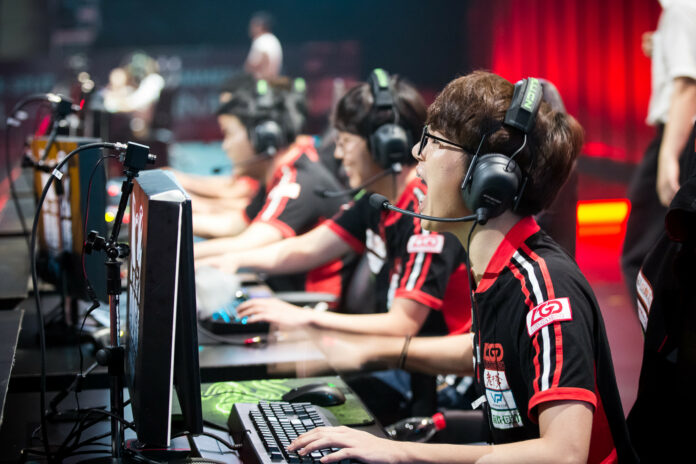Given their similarities, it can be difficult to draw a connection between gaming and sports. However, they both have unique distinctions but very close relativizes.
Let’s explore both worlds in detail:
Gaming and Sports at A Glance
| Types | Characteristics | Examples | |
| Gaming | Casual gaming | Requires lesser time commitment to play for pleasure or money (online). | Puzzle games, trivia games, board games, etc. |
| Hardcore gaming | Requires a lot of time to play entirely for gain (money) (online). | Yakuza, Sekiro: Shadows Die Twice, Personas, Monster Hunters, etc. | |
| Professional gaming, | Gaming is a profession for financial benefit and sponsorship. Also, participates in game creation for business purposes (online). | Card games, Fighting games, First-person shooters, etc. | |
| Sports | Individual sports | Played by one contestant for an individual reward without team members (online or offline). | Boxing, Tennis, Wrestling, Cycling, etc. |
| Team sports | Played by a group of team members for general interest (online or offline). | Football, Basketball, Baseball, etc. | |
| Extreme sports | Sports activities with a higher risk involved (offline). | Cave diving, Mountain biking, Rock climbing, etc. |
Gaming
The term “gaming” describes playing video or online games on a console, computer, smartphone, or other electronic device.
The term “gaming” has nuance and refers to repeated play, perhaps as a hobby. Some online multiplayer games, such as casino 25 euro bez depozytu za samą rejestrację have transformed gaming from primarily solitary to well-liked social activity. Gaming enthusiasts are frequently referred to as “gamers.”
Gaming is a social and enjoyable way to foster teamwork, spend time, and develop skills.
However, there are some concerns you should keep in mind:
- Kids are able to engage and chat with people all around the world in some games. They might encounter rude people and bullying.
- Certain games allow players to buy additional items like loot boxes while playing; as a result, kids have been observed to accrue hefty expenses without realizing it.
- Bullying can occasionally be a strategy employed to win games. Young people may experience bullying on a higher scale.
- Certain games can be difficult to stop between battles since quitting has consequences, and kids could feel bad about failing their teammates.
Types of Gaming
Depending on how frequently and actively gamers engage, gaming activities are frequently divided into numerous types.
Below are three of the most popular types of gaming exercises.
Casual gaming
It is the word used to describe video games that don’t demand a significant time commitment to play, enjoy, and win. Casual gaming does not, however, have set rules.
Technically speaking, anyone who enjoys playing video games is a casual gamer. A casual gamer might love playing more challenging, engrossing video games, but they don’t have much time to devote to them.
Since its introduction in 1990, Microsoft’s Solitaire has attracted almost 400 million players, making it the first hugely popular casual game on a personal computer.
Hardcore gaming
It involves putting in a lot of time, anywhere from 20 to 40 hours—and, occasionally, money—on video games. Hardcore gamers have strong self-esteem and high impatience, which impacts their ability to control themselves and make decisions.
Their self-worth is enhanced by their accomplishments and reputation in the virtual world. They identify themselves by their gaming lifestyle and reputation.
Being a hardcore gamer is not an issue, provided you put your life outside the gaming sphere under control. This entails caring for your physical and emotional well-being, pausing when needed, and attending to your obligations when necessary.
Professional gaming
Professional gaming is the act of playing interactive games, particularly video games, desktop role-playing games, and mastery card games, for frequently extended periods. “Professional gamers” are individuals who enjoy playing such games.
Professional gamers dedicate much of their time to playing video games in competitions to win cash, prizes, or accolades, or just for the pure joy of competition and defeating challenges.
Investors or sponsors pay professional gamers to compete, and they occasionally join forces with other gamers to form teams.
The word “gaming” may mean “legal gambling” in some nations like the UK and Australia. Professional gaming can be both traditional and digital through internet gambling.
Sports

Sports are all physical activities or games, frequently competitive and/or organized, that intend to use, maintain, or enhance physical skills and abilities while bringing enjoyment to those involved and spectators.
The sport requires a more involved audience. Fans of today anticipate being capable of communicating their experiences across all geographical barriers.
The term “sport” stems from an ancient French desport, signifying “leisure”, with the first definition being “whatever humans find amusing or interesting.
Additional definitions may include betting and gambling-related events, hunting, games, and amusements requiring physical activity.
Types of sports
Individual sports
Individual sports are sports that are played by one person without teammates. These are sports games where two teams participate, but the contest is usually for an individual prize.
Individual sports include
Badminton, Boxing, Figure skating, Bowling, Golf, Snowboarding, Surfing, Cycling, Skiing, etc.
Team sports
Team sports, as the name implies, feature a larger number of individuals (teammates), cooperating and contending against another larger group (or several), either online or offline.
Team sports like football, basketball, baseball, etc., frequently have the largest fan bases that support their favorite teams. They are also the most enjoyable to watch and the most popular to play.
Team sports include Basketball, Baseball, Handball, Volleyball, Football, Hockey, Swimming, etc.
Extreme sports
These types of sports carry a lot of risks. These pursuits frequently require great physical effort, heights, speed, and specialized equipment.
It is unclear where the term “extreme sports” first appeared, but it rose to fame in the 1990s when advertising firms used it to advertise the X Games.
Extreme sports include Canyoning, Cave diving, Freediving, Ice climbing, Motorcycle sport, Mountainboarding, Cave diving, Mountain biking, Rock climbing, etc.
Conclusion
Gaming and sports are similar, even though there are slight differences. They vary primarily because one requires mental involvement for amusement or gain, while the other requires physical participation. The fundamental distinction between their involvements, albeit both, could be motivated equally by interests or pleasure.
RELATED TOPICS:
WPC16 – WPC16 DASHBOARD LOGIN : COMPLETE GUIDE
Wpc15 Dashboard – Everything You Need to know
Why Do Kids Love 3D Games Over 2D?




